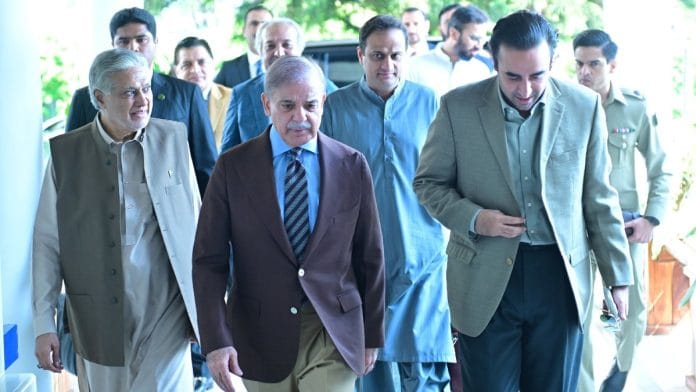New Delhi: Pakistan Prime Minister Shehbaz Sharif Saturday said the nation was willing to take part in any “neutral and transparent” investigation into the Pahalgam terror attack, a day after Pakistan Peoples Party (PPP) chairman Bilawal Bhutto-Zardari declared that “either our water flows in this Indus or it will be their blood,” referring to India’s decision to put the Indus Waters Treaty (IWT) in abeyance.
Tensions have escalated between the two nuclear neighbours in the wake of the killing of 26 tourists by terrorists in Kashmir’s Pahalgam. The terrorists, who singled out male Hindu tourists, are suspected to be affiliated with the Pakistan-based Lashkar-e-Taiba (LeT).
Speaking at the passing-out parade at Pakistan Military Academy in Kakul, Sharif said Saturday: “The recent tragedy in Pahalgam is yet another example of this perpetual blame game, which must come to a grinding halt. Continuing with its role as a responsible country, Pakistan is open to participating in any neutral, transparent and credible investigation.”
Sharif accused India of following a “pattern of exploitation, levelling baseless allegations and false accusations without credible investigation or verifiable evidence”.
Reiterating Pakistan’s long-standing stance on Kashmir, he said: “I also need to underscore the importance of Kashmir, as the founder of the nation Quaid-e-Azam Mohammad Ali Jinnah rightly said, Kashmir is the jugular vein of Pakistan. Unfortunately, this globally recognised dispute remains unresolved despite multiple UN resolutions.”
“Let there be no doubt, Pakistan shall continue to support the right of self-determination of the Kashmiri people till they achieve it through their great struggle and sacrifices,” he added.
In this, Sharif reiterated Pakistan Army Chief Gen Asim Munir’s words, describing Kashmir as the “jugular vein” of Pakistan. Munir had made the remarks while addressing Overseas Pakistanis in Islamabad just last week.
Less than 24 hours before Sharif spoke on the Pahalgam terror attack, Bilawal said that “either our water flows in this Indus or it will be their blood because the river belongs to Pakistan and any move to strip it away will meet fierce resistance”.
India Wednesday put the 1960 IWT, which allows Pakistan unrestricted use of waters of the three western rivers Jhelum, Chenab and Sutlej, in abeyance as a punitive measure following the Pahalgam attack. Under IWT, India has the right to use water of the eastern rivers, Sutlej, Ravi and Beas.
Bilawal termed it an “attack on Pakistan’s lifeline”. Speaking at a public rally along the banks of the Indus in Sukkur, he slammed India’s move, calling it a provocation designed to “fool the Indian public and hide the government’s failures”.
“To stand here beside the Indus is to remember our history,” Bhutto said. “(Prime Minister Narendra) Modi talks about ancient Indus civilisation. We have Mohenjodaro. The Indus is ours, and it will remain ours. Every Sindhi, every Pakistani will fight back.”
The treaty has governed the usage of the Indus basin rivers since 1960, and India’s move to hold it in abeyance has triggered both domestic outrage in Pakistan and diplomatic confrontation. Pakistan has vowed to contest India’s move, calling the treaty a crucial peace mechanism between the two nations.
The crisis over Indus water rights has also intensified internal tensions in Pakistan.
A day before Bilawal’s speech, Pakistan suspended its controversial Cholistan canal project aimed at irrigating desert land. Though pitched as a solution to food insecurity, the project had sparked protests across Sindh—Pakistan’s lower riparian province—over fears it would worsen already dire water shortages.
The Cholistan project involves construction of six canals—two each in Pakistan’s Punjab, Sindh and Balochistan. Five of the canals will draw from the Indus River, while the sixth will use the Sutlej River. “We will fight like we fought against the construction of the canals. Our population may be smaller, but we are more courageous,” Bilawal said Friday.
“Right now, the enemy is eyeing the Indus river and we will give them an apt response. We are united. And we will fight until India takes its decision back,” he added.
(Edited by Nida Fatima Siddiqui)






